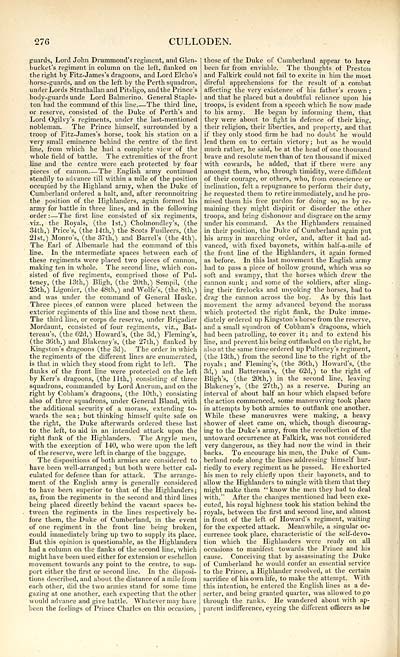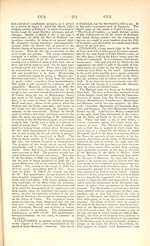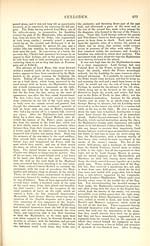Topographical, statistical, and historical gazetteer of Scotland > Volume 1
(358) Page 276
Download files
Complete book:
Individual page:
Thumbnail gallery: Grid view | List view

276
CULLODEN.
guards, Lord John Drummond's regiment, and Glen-
bucket's regiment in column on the left, flanked on
the right by Fitz-James's dragoons, and Lord Elcho's
horse-guards, and on the left by the Perth squadron,
under Lords Strathallan and Pitsligo, and the Prince's
body-guards unde Lord Balmerino. General Staple-
ton had the command of this line The third line,
or reserve, consisted of the Duke of Perth's and
Lord Ogilvy's regiments, under the last-mentioned
nobleman. The Prince himself, surrounded by a
troop of Fitz-James's horse, took his station on a
very small eminence behind the centre of the first
line, from which he had a complete view of the
whole field of battle. The extremities of the fro/it
line and the centre were each protected by four
pieces of cannon The English army continued
steadily to advance till within a mile of the position
occupied by the Highland army, when the Duke of
Cumberland ordered a halt, and, after reconnoitring
the position of the Highlanders, again formed his
army for battle in three lines, and in the following
order : — The first line consisted of six regiments,
viz., the Royals, (the 1st,) Cholmondley's, (the
31th,) Price's, (the 14th,) the Scots Fusileers, (the
21st,). Monro's, (the 37th,) and Barrel's (the 4tb).
The Earl of Albemarle had the command of this
line. In the intermediate spaces between each of
these regiments were placed two pieces of cannon,
making ten in whole. The second line, which con-
sisted of five regiments, comprised those of Pul-
teney, (the 13th,) Bligh, (the 20th,) Sempil, (the
25th,) Ligonier, (the 48th,) and Wolfe's, (the 8th,)
and was under the command of General Huske.
Three pieces of cannon were placed between the
exterior regiments of this line and those next them.
The third line, or corps de reserve, under Brigadier
Mordaunt, consisted of four regiments, viz., Bat-
tereau's, (the 62d,) Howard's, (the 3d,) Fleming's,
(the 36th,) and Blakeney's, (the 27th,) flanked by
Kingston's dragoons (the 3d). The order in which
the regiments of the different lines are enumerated,
is that in which they stood from right to left. The
flanks of the front line were protected on the left
by Kerr's dragoons, (the 11th,) consisting of three
squadrons, commanded by Lord Ancrum, and on the
right by Cobham's dragoons, (the 10th,) consisting
also of three squadrons, under General Bland, with
the additional security of a morass, extending to-
wards the sea ; but thinking himself quite safe on
the right, the Duke afterwards ordered these last
to the left, to aid in an intended attack upon the
right flank of the Highlanders. The Argyle men,
with the exception of 140, who were upon the left
of the reserve, were left in charge of the baggage.
The dispositions of both armies are considered to
have been well-arranged ; but both were better cal-
culated for defence than for attack. The arrange-
ment of the English army is generally considered
to have been superior to that of the Highlanders;
as, from the regiments in the second and third lines
being placed directly behind the vacant spaces be-
tween the regiments in the lines respectively be-
fore them, the Duke of Cumberland, in the event
of one regiment in the front line being broken,
could immediately bring up two to supply its place.
But this opinion is questionable, as the Highlanders
had a column on the flanks of the second line, which
might have been used either for extension or eschellon
movement towards any point to the centre, to sup-
port either the first or second line. In the disposi-
tions described, and about the distance of a mile from
each other, did the two armies stand for some time
gazing at one another, each expecting that the other
would advance and give battle. Whatever may have
been the feelings of Prince Charles on this occasion,
those of the Duke of Cumberland appear to have
been far from enviable. The thoughts of Preston
and Falkirk could not fail to excite in him the most
direful apprehensions for the result of a combat
affecting the very existence of his father's crown ;
and that he placed but a doubtful reliance upon his
troops, is evident from a speech which he now made
to his army. He began by informing them, that
they were about to fight in defence of their king,
their religion, their liberties, and property, and that
if they only stood firm he had no doubt he would
lead them on to certain victory ; but as he would
much rather, he said, be at the head of one thousand
brave and resolute men than of ten thousand if mixed
with cowards, he added, that if there were any
amongst them, who, through timidity, were diffident
of their courage, or others, who, from conscience or
inclination, felt a repugnance to perform their duty,
he requested them to retire immediately, and he pro-
mised them his free pardon for doing so, as by re-
maining they might dispirit or disorder the other
troops, and bring dishonour and disgrace on the army
under his command. As the Highlanders remained
in their position, the Duke of Cumberland again put
his army in marching order, and, after it had ad-
vanced, with fixed bayonets, within half-a-mile of
the front line of the Highlanders, it again formed
as before. In this last movement the English army
had to pass a piece of hollow ground, which was so
soft and swampy, that the horses which drew the
cannon sunk ; and some of the soldiers, after sling-
ing their firelocks and unyoking the horses, had to
drag the cannon across the bog. As by this last
movement the army advanced beyond the morass
which protected the right flank, the Duke imme-
diately ordered up Kingston's horse from the reserve,
and a small squadron of Cobham's dragoons, which
had been patrolling, to cover it ; and to extend his
line, and prevent his being outflanked on the right, he
also at the same time ordered up Pulteney's regiment,
(the 13th,) from the second fine to the right of the
royals ; and Fleming's, (the 36th,) Howard's, (the
3d,) and Battereau's, (the 62d,) to the right of
Bligh's, (the 20th,) in the second line, leaving
Blakeney's, (the 27th,) as a reserve. During an
interval of about half an hour which elapsed before
the action commenced, some manoeuvring took place
in attempts by both armies to outflank one another.
While these manoeuvres were making, a heavy
shower of sleet came on, which, though discourag-
ing to the Duke's army, from the recollection of the
untoward occurrence at Falkirk, was not considered
very dangerous, as they had now the wind in their
backs. To encourage his men, the Duke of Cum-
berland rode along the lines addressing himself hur-
riedly to every regiment as he passed. He exhorted
his men to rely chiefly upon their bayonets, and to
allow the Highlanders to mingle with them that they
might make them " know the men they had to deal
with." After the changes mentioned had been exe-
cuted, his royal highness took his station behind the
royals, between the first and second line, and almost
in front of the left of Howard's regiment, waiting
for the expected attack. Meanwhile, a singular oc-
currence took place, characteristic of the self-devo-
tion which the Highlanders were ready on all
occasions to manifest towards the Prince and his
cause. Conceiving that by assassinating the Duke
of Cumberland he would confer an essential service
to the Prince, a Highlander resolved, at the certain
sacrifice of his own life, to make the attempt. With
this intention, he entered the English lines as a de-
serter, and being granted quarter, was allowed to go
through the ranks. He wandered about with ap-
parent indifference, eyeing the different officers as he
CULLODEN.
guards, Lord John Drummond's regiment, and Glen-
bucket's regiment in column on the left, flanked on
the right by Fitz-James's dragoons, and Lord Elcho's
horse-guards, and on the left by the Perth squadron,
under Lords Strathallan and Pitsligo, and the Prince's
body-guards unde Lord Balmerino. General Staple-
ton had the command of this line The third line,
or reserve, consisted of the Duke of Perth's and
Lord Ogilvy's regiments, under the last-mentioned
nobleman. The Prince himself, surrounded by a
troop of Fitz-James's horse, took his station on a
very small eminence behind the centre of the first
line, from which he had a complete view of the
whole field of battle. The extremities of the fro/it
line and the centre were each protected by four
pieces of cannon The English army continued
steadily to advance till within a mile of the position
occupied by the Highland army, when the Duke of
Cumberland ordered a halt, and, after reconnoitring
the position of the Highlanders, again formed his
army for battle in three lines, and in the following
order : — The first line consisted of six regiments,
viz., the Royals, (the 1st,) Cholmondley's, (the
31th,) Price's, (the 14th,) the Scots Fusileers, (the
21st,). Monro's, (the 37th,) and Barrel's (the 4tb).
The Earl of Albemarle had the command of this
line. In the intermediate spaces between each of
these regiments were placed two pieces of cannon,
making ten in whole. The second line, which con-
sisted of five regiments, comprised those of Pul-
teney, (the 13th,) Bligh, (the 20th,) Sempil, (the
25th,) Ligonier, (the 48th,) and Wolfe's, (the 8th,)
and was under the command of General Huske.
Three pieces of cannon were placed between the
exterior regiments of this line and those next them.
The third line, or corps de reserve, under Brigadier
Mordaunt, consisted of four regiments, viz., Bat-
tereau's, (the 62d,) Howard's, (the 3d,) Fleming's,
(the 36th,) and Blakeney's, (the 27th,) flanked by
Kingston's dragoons (the 3d). The order in which
the regiments of the different lines are enumerated,
is that in which they stood from right to left. The
flanks of the front line were protected on the left
by Kerr's dragoons, (the 11th,) consisting of three
squadrons, commanded by Lord Ancrum, and on the
right by Cobham's dragoons, (the 10th,) consisting
also of three squadrons, under General Bland, with
the additional security of a morass, extending to-
wards the sea ; but thinking himself quite safe on
the right, the Duke afterwards ordered these last
to the left, to aid in an intended attack upon the
right flank of the Highlanders. The Argyle men,
with the exception of 140, who were upon the left
of the reserve, were left in charge of the baggage.
The dispositions of both armies are considered to
have been well-arranged ; but both were better cal-
culated for defence than for attack. The arrange-
ment of the English army is generally considered
to have been superior to that of the Highlanders;
as, from the regiments in the second and third lines
being placed directly behind the vacant spaces be-
tween the regiments in the lines respectively be-
fore them, the Duke of Cumberland, in the event
of one regiment in the front line being broken,
could immediately bring up two to supply its place.
But this opinion is questionable, as the Highlanders
had a column on the flanks of the second line, which
might have been used either for extension or eschellon
movement towards any point to the centre, to sup-
port either the first or second line. In the disposi-
tions described, and about the distance of a mile from
each other, did the two armies stand for some time
gazing at one another, each expecting that the other
would advance and give battle. Whatever may have
been the feelings of Prince Charles on this occasion,
those of the Duke of Cumberland appear to have
been far from enviable. The thoughts of Preston
and Falkirk could not fail to excite in him the most
direful apprehensions for the result of a combat
affecting the very existence of his father's crown ;
and that he placed but a doubtful reliance upon his
troops, is evident from a speech which he now made
to his army. He began by informing them, that
they were about to fight in defence of their king,
their religion, their liberties, and property, and that
if they only stood firm he had no doubt he would
lead them on to certain victory ; but as he would
much rather, he said, be at the head of one thousand
brave and resolute men than of ten thousand if mixed
with cowards, he added, that if there were any
amongst them, who, through timidity, were diffident
of their courage, or others, who, from conscience or
inclination, felt a repugnance to perform their duty,
he requested them to retire immediately, and he pro-
mised them his free pardon for doing so, as by re-
maining they might dispirit or disorder the other
troops, and bring dishonour and disgrace on the army
under his command. As the Highlanders remained
in their position, the Duke of Cumberland again put
his army in marching order, and, after it had ad-
vanced, with fixed bayonets, within half-a-mile of
the front line of the Highlanders, it again formed
as before. In this last movement the English army
had to pass a piece of hollow ground, which was so
soft and swampy, that the horses which drew the
cannon sunk ; and some of the soldiers, after sling-
ing their firelocks and unyoking the horses, had to
drag the cannon across the bog. As by this last
movement the army advanced beyond the morass
which protected the right flank, the Duke imme-
diately ordered up Kingston's horse from the reserve,
and a small squadron of Cobham's dragoons, which
had been patrolling, to cover it ; and to extend his
line, and prevent his being outflanked on the right, he
also at the same time ordered up Pulteney's regiment,
(the 13th,) from the second fine to the right of the
royals ; and Fleming's, (the 36th,) Howard's, (the
3d,) and Battereau's, (the 62d,) to the right of
Bligh's, (the 20th,) in the second line, leaving
Blakeney's, (the 27th,) as a reserve. During an
interval of about half an hour which elapsed before
the action commenced, some manoeuvring took place
in attempts by both armies to outflank one another.
While these manoeuvres were making, a heavy
shower of sleet came on, which, though discourag-
ing to the Duke's army, from the recollection of the
untoward occurrence at Falkirk, was not considered
very dangerous, as they had now the wind in their
backs. To encourage his men, the Duke of Cum-
berland rode along the lines addressing himself hur-
riedly to every regiment as he passed. He exhorted
his men to rely chiefly upon their bayonets, and to
allow the Highlanders to mingle with them that they
might make them " know the men they had to deal
with." After the changes mentioned had been exe-
cuted, his royal highness took his station behind the
royals, between the first and second line, and almost
in front of the left of Howard's regiment, waiting
for the expected attack. Meanwhile, a singular oc-
currence took place, characteristic of the self-devo-
tion which the Highlanders were ready on all
occasions to manifest towards the Prince and his
cause. Conceiving that by assassinating the Duke
of Cumberland he would confer an essential service
to the Prince, a Highlander resolved, at the certain
sacrifice of his own life, to make the attempt. With
this intention, he entered the English lines as a de-
serter, and being granted quarter, was allowed to go
through the ranks. He wandered about with ap-
parent indifference, eyeing the different officers as he
Set display mode to: Large image | Transcription
Images and transcriptions on this page, including medium image downloads, may be used under the Creative Commons Attribution 4.0 International Licence unless otherwise stated. ![]()
| Gazetteers of Scotland, 1803-1901 > Topographical, statistical, and historical gazetteer of Scotland > Volume 1 > (358) Page 276 |
|---|
| Permanent URL | https://digital.nls.uk/97441842 |
|---|
| Description | Volume first. A-H. |
|---|---|
| Attribution and copyright: |
|

